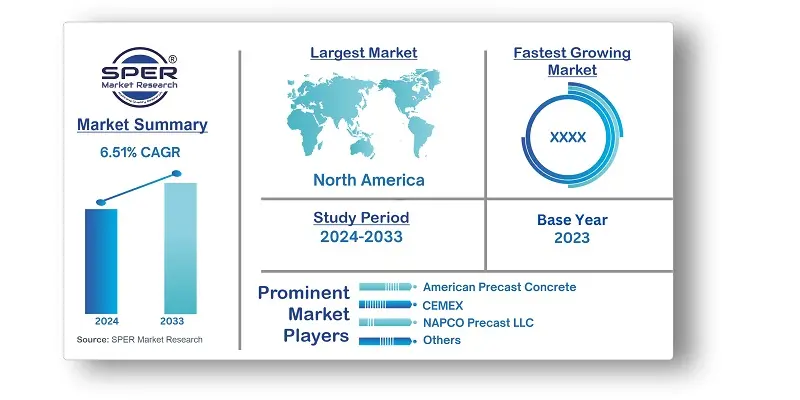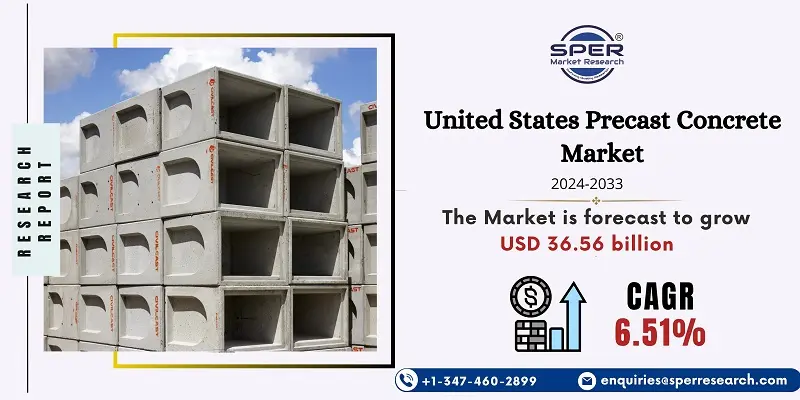
United States Precast Concrete Market Growth, Size, Trends, Demand, Revenue and Future Outlook
United States Precast Concrete Market Size- By Type, By Product, By End User- Regional Outlook, Competitive Strategies and Segment Forecast to 2033
| Published: May-2024 | Report ID: COAM2421 | Pages: 1 - 107 | Formats*: |
| Category : Construction & Manufacturing | |||
- Feb 2020: To increase efficiency for the design of structural precast concrete structures, The American Concrete Institute and Precast/Prestressed Concrete Institute announced a new, expanded relationship in February 2020. This is a direct reaction to industry demands for building code specifications that take into account the unique features of precast concrete design.
- July 2021: In July 2021, Barbour Concrete Company & Barbour Building Systems, a provider of precast concrete products used in infrastructure applications such as drainage, stormwater management, utility construction, and other uses, was bought by Forterra Inc. This acquisition is expanding the company’s product line.

Market Opportunities and Challenges

| Report Metric | Details |
| Market size available for years | 2020-2033 |
| Base year considered | 2023 |
| Forecast period | 2024-2033 |
| Segments covered | By Type, By Product, By End Use. |
| Regions covered | Northeast, Midwest, South, West. |
| Companies Covered | American Precast Concrete, Inc., CEMEX , Concrete Pipe & Precast LLC, Kawneer, Metromont Corporation, NAPCO Precast LLC, Tindall Corporation, Oldcastle Inc. |
- Construction Companies
- Architects and Engineers
- Government Agencies
- Real Estate Developers
- Civil Contractors
- Property Owners and Managers
- Environmental Agencies
- Utility Companies
- Educational Institutions
- Homeowners and DIY Enthusiasts
| By Type: |
|
| By Products: |
|
| By End Use: |
|
- United States Precast Concrete Market Size (FY’2024-FY’2033)
- Overview of United States Precast Concrete Market
- Segmentation of United States Precast Concrete Market By Type (Floors and Roofs, Columns and Beams, Stairs and Landing. Walls)
- Segmentation of United States Precast Concrete Market By Product (Structural Building Component, Architectural Building Components, Transportation Products, Water and Waste Handling Products, Others)
- Segmentation of United States Precast Concrete Market By End Use (Residential and Non-Residential)
- Statistical Snap of United States Precast Concrete Market
- Expansion Analysis of United States Precast Concrete Market
- Problems and Obstacles in United States Precast Concrete Market
- Competitive Landscape in the United States Precast Concrete Market
- Impact of COVID-19 and Demonetization on United States Precast Concrete Market
- Details on Current Investment in United States Precast Concrete Market
- Competitive Analysis of United States Precast Concrete Market
- Prominent Players in the United States Precast Concrete Market
- SWOT Analysis of United States Precast Concrete Market
- United States Precast Concrete Market Future Outlook and Projections (FY’2023-FY’2033)
- Recommendations from Analyst
1.1. Scope of the report1.2. Market segment analysis
2.1. Research data source2.1.1. Secondary Data2.1.2. Primary Data2.1.3. SPER’s internal database2.1.4. Premium insight from KOL’s2.2. Market size estimation2.2.1. Top-down and Bottom-up approach2.3. Data triangulation
4.1. Driver, Restraint, Opportunity and Challenges analysis4.1.1. Drivers4.1.2. Restraints4.1.3. Opportunities4.1.4. Challenges4.2. COVID-19 Impacts of the United States Precast Concrete Market.
5.1. SWOT Analysis5.1.1. Strengths5.1.2. Weaknesses5.1.3. Opportunities5.1.4. Threats5.2. PESTEL Analysis5.2.1. Political Landscape5.2.2. Economic Landscape5.2.3. Social Landscape5.2.4. Technological Landscape5.2.5. Environmental Landscape5.2.6. Legal Landscape5.3. PORTER’s Five Forces5.3.1. Bargaining power of suppliers5.3.2. Bargaining power of buyers5.3.3. Threat of Substitute5.3.4. Threat of new entrant5.3.5. Competitive rivalry5.4. Heat Map Analysis
6.1. United States Precast Concrete Market Manufacturing Base Distribution, Sales Area, Product Type6.2. Mergers & Acquisitions, Partnerships, Product Launch, and Collaboration in United States Precast Concrete Market
7.1. United States Precast Concrete Market Size, Share and Forecast, By Type, 2020-20267.2. United States Precast Concrete Market Size, Share and Forecast, By Type, 2027-20337.3. Floors and Roofs7.4. Columns and Beams7.5. Stairs and Landing
7.6. Walls
8.1. United States Precast Concrete Market Size, Share and Forecast, By Products, 2020-20268.2. United States Precast Concrete Market Size, Share and Forecast, By Products, 2027-20338.3. Structural Building Component8.4. Architectural Building Components8.5. Transportation Products8.6. Water and Waste Handling Products8.7. Others
9.1. United States Precast Concrete Market Size, Share and Forecast, By End Use, 2020-20269.2. United States Precast Concrete Market Size, Share and Forecast, By End Use,2027-20339.3. Non- Residential9.4. Residential
10.1. United States Precast Concrete Market Size and Market Share
11.1. United States Precast Concrete Market Size and Market Share By Region (2020-2026)11.2. United States Precast Concrete Market Size and Market Share By Region (2027-2033)11.3. Northeast11.4. Midwest11.5. South
11.6. west
12.1. American Precast Concrete, Inc.12.1.1. Company details12.1.2. Financial outlook12.1.3. Product summary12.1.4. Recent developments12.2. CEMEX12.2.1. Company details12.2.2. Financial outlook12.2.3. Product summary12.2.4. Recent developments12.3. Concrete Pipe & Precast LLC12.3.1. Company details12.3.2. Financial outlook12.3.3. Product summary12.3.4. Recent developments12.4. Kawneer12.4.1. Company details12.4.2. Financial outlook12.4.3. Product summary12.4.4. Recent developments12.5. Metromont Corporation12.5.1. Company details12.5.2. Financial outlook12.5.3. Product summary12.5.4. Recent developments12.6. NAPCO Precast LLC12.6.1. Company details12.6.2. Financial outlook12.6.3. Product summary12.6.4. Recent developments12.7. Tindall Corporation12.7.1. Company details12.7.2. Financial outlook12.7.3. Product summary12.7.4. Recent developments12.8. Oldcastle Inc.12.8.1. Company details12.8.2. Financial outlook12.8.3. Product summary12.8.4. Recent developments12.9. Others
SPER Market Research’s methodology uses great emphasis on primary research to ensure that the market intelligence insights are up to date, reliable and accurate. Primary interviews are done with players involved in each phase of a supply chain to analyze the market forecasting. The secondary research method is used to help you fully understand how the future markets and the spending patterns look likes.
The report is based on in-depth qualitative and quantitative analysis of the Product Market. The quantitative analysis involves the application of various projection and sampling techniques. The qualitative analysis involves primary interviews, surveys, and vendor briefings. The data gathered as a result of these processes are validated through experts opinion. Our research methodology entails an ideal mixture of primary and secondary initiatives.



Frequently Asked Questions About This Report
PLACE AN ORDER
Year End Discount
Sample Report
Pre-Purchase Inquiry
NEED CUSTOMIZATION?
Request CustomizationCALL OR EMAIL US
100% Secure Payment






Related Reports
Our Global Clients
Our data-driven insights have influenced the strategy of 200+ reputed companies across the globe.






















